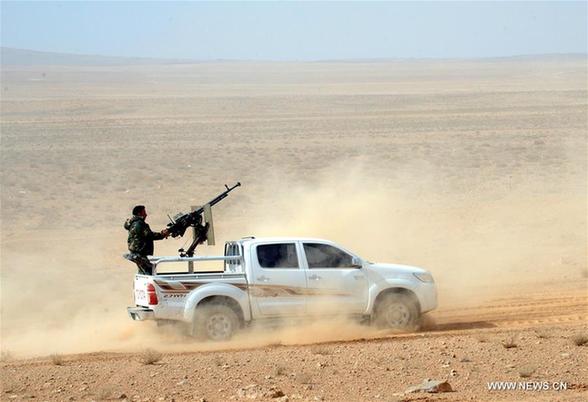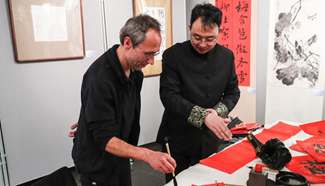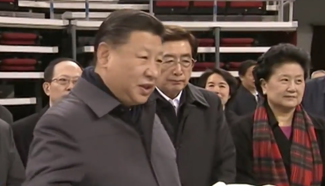
A Syrian soldier fires his Dushka machine gun against rebel positions in the countryside of Homs province, central Syria, on March 19, 2016. (Xinhua/Ammar)
BEIJING, Feb. 17 (Xinhua) -- After rounds of peace talks on Syria, including the latest Astana meeting, the hope of implementing a ceasefire and achieving reconciliation in the war-torn country seems to diminish.
At the Astana peace talks, which started on Thursday after being postponed one day for technical reasons, Russia, Iran and Turkey agreed to create a tripartite operational group to monitor Syria's ceasefire.
Meanwhile, a special mechanism for the exchange of hostages was created at the meeting.
However, "it is still very far to direct the Syrian dialogue, the volume of mutual distrust is high enough and there are a lot of mutual accusations," said Alexander Lavrentyev, head of the Russian delegation at a press conference after the meeting.
The meeting, attended by representatives from the Syrian government, rebels, Russia, Turkey, Iran, Jordan, as well as the United Nations and the United States as observers, failed to reach two agreements as anticipated before the gathering.
The meeting, the second time in three weeks in Kazakhstan that Syrian government officials are sitting face-to-face with the rebels, finally saw the opposing Syrian groups exchanging angry tirades at each other.
Their brokers also showed differing views. Turkey is fiercely opposed to Syrian President Bashar al-Assad, while Russia and the third co-sponsor, Iran, are Assad's staunchest allies.
The first such event was held on Feb. 6 in Astana, where Russia, Turkey and Iran only issued a joint communique instead of achievement documents as originally planned.
The next meeting on Syria will take place in Astana within 30 days. Working groups will gather to continue working on the peace process.
Analysts believed that firstly, the parties concerned remain divided over many substantial issues; secondly, to realize a real ceasefire, foreign forces which are engaged in the Syrian civil war need to reach an agreement; thirdly, as not all rebel groups were included in the talks, it is questionable whether a complete ceasefire could be reached in Syrian territory.
Rounds of Syrian peace talks have taken place in the Swiss city of Geneva under the auspices of the United Nations (UN), but little progress has been made mainly due to continuous fighting in the Middle Eastern country.
A new round of intra-Syrian peace talks is scheduled to kick off on Feb. 23 in Geneva.
Related:
Iran, Russia and Turkey to create monitoring group on Syria
ASTANA, Feb. 16 (Xinhua) -- Russia, Iran and Turkey agreed on Thursday at a peace talk held here in Astana to create a tripartite operational group to monitor Syria's ceasefire, a Russian foreign ministry official said.
The monitoring group will work on the monitoring of the cessation of hostilities, termination of any violations by any party and take confidence-building measures to continue the peace making process, said Director of the Middle East and North Africa Department of Russian Ministry of Foreign Affairs, Sergey Vershinin, during Moscow-Astana-Damascus videoconference in Astana on Thursday. Full Story













